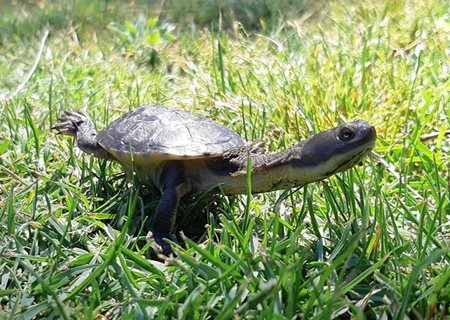 About Southwestern snake-necked turtles
About Southwestern snake-necked turtles
Scientific name: Chelodina colliei
Conservation status: Listed as 'near threatened' by the International Union for Conservation of Nature (IUCN).
Appearance:
- Distinctive oblong shaped shell, dark brown to black in colour;
- Pale yellow underside;
- Olive grey skin with dark mottling;
- Streamlined head with a long neck that can grow up to 20cm in length; and
- Webbed feet with four claws.
Size: The shell length is usually up to 30cm and the total length can be up to 50cm.
Habitat: Freshwater wetlands, lakes and rivers, including urban lakes in the Perth metropolitan region and farm dams.
Diet: Adults are underwater apex predators, generalist feeders, and opportunistic carnivores. The diet changes seasonally and consists of a broad range of macro-invertebrates, carrion, frogs and fish. Hatchlings also eat aquatic plants as well as midge and mosquito larvae.
Major threats: Injury by road traffic, predation by foxes and dogs, fencing and barriers restricting migration, illegal fishing by humans, and fragmentation of natural habitat.